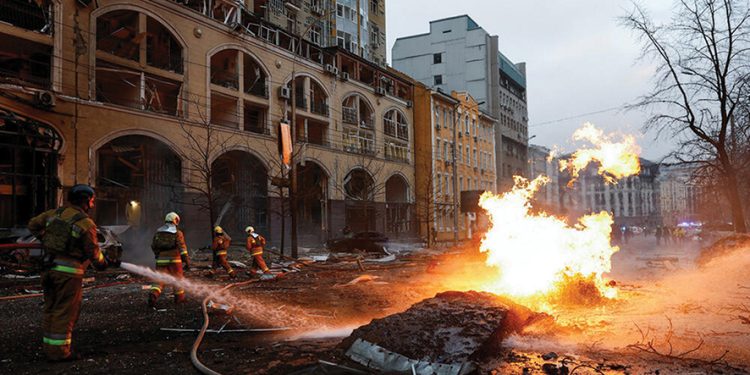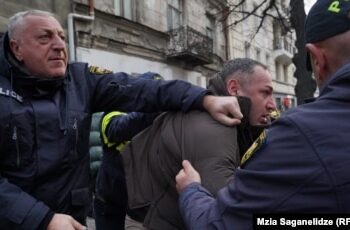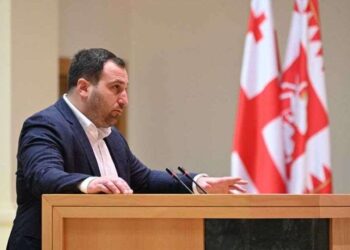On Christmas morning, a massive Russian missile attack targeted Ukraine’s energy infrastructure, with over 70 missiles and 100 drones hitting various regions. Ukrainian President Volodymyr Zelenskyy condemned the assault as “inhuman,” emphasizing that Putin had deliberately chosen Christmas to strike. The attacks caused widespread power outages, leaving hundreds of thousands without heating in freezing temperatures, particularly in Kharkiv. Kyiv and other areas also faced blackouts.
Zelenskyy vowed that the attacks wouldn’t break Ukraine’s spirit, while energy minister German Galushchenko confirmed that restrictions on electricity supply were imposed to minimize damage. In Kharkiv, at least three people were injured in missile strikes. Further casualties were reported in Dnipropetrovsk and Kherson regions.
Russia’s defense ministry confirmed the strike was aimed at critical energy infrastructure crucial to Ukraine’s defense industry. US Ambassador Bridget Brink labeled the attacks “Russia’s Christmas gift to Ukraine,” while UK Prime Minister Keir Starmer praised the resilience of the Ukrainian people.
Meanwhile, Ukrainians celebrated their second Christmas on December 25, following the shift to the new calendar, further distancing themselves from Russian influence. Since Russia’s invasion in February 2022, Ukraine’s power grid has been severely damaged, and Kyiv has repeatedly called for stronger air defense systems to protect against Russian airstrikes.
This marked the 13th major attack on Ukraine’s energy sector, as Russia’s offensive continues. In retaliation, Ukraine launched drone strikes on Russian regions, including Kursk and North Ossetia. The ongoing war has seen both sides strengthen their positions as they await potential talks under the incoming US administration.
Other key developments include:
• On the weekend, a Russian ballistic missile attack on Kyiv killed at least one person and injured 12 others. The attack damaged a number of buildings in the capital and left over 600 residential buildings as well as medical facilities and schools.
• The Russian military attacked Ukraine with 72 Shahed-type drones and other unmanned aerial vehicles overnight on December 23, Ukraine’s Air Force reported on Telegram, killing three and injuring three others. Friday’s attack featured Khinzal missiles launched by Russian fighter jets, as well as Iskander-Ms fired from ground platforms. North Korean KN-23 missiles – sent by Pyongyang to Moscow earlier this year – may have been deployed as well.
• Russia said it targeted arms industry and security service targets in strikes on Kyiv as a “response” to last week’s strikes by Ukraine using Western missiles on a chemical plant in southern Russia. Russia said that Ukraine had launched six US-made long-range ATACMs missiles and four British-made Storm Shadow missiles at Russia’s southern Rostov region on Wednesday.
• The Russian Defense Ministry said that its forces had taken control of two more settlements in Ukraine’s Donetsk region, Uspenivka and Novopustynka. Russia has been moving toward the strategic city of Pokrovsk. Pokrovsk is the birthplace of the beloved carol ‘Carol of the Bells,’ composed by the renowned Mykola Leontovych. It is believed that Leontovych composed the early scores of this piece, inspired by a Ukrainian folk chant, while living and working in Pokrovsk from 1904 to 1908.
• Speaking last Thursday at an end-of-year press conference, Putin claimed the war had made Russia “much stronger”. He said he was ready to meet the incoming US president, Donald Trump, to discuss peace proposals. But he repeated his stance that Moscow would keep control of Crimea, plus four Ukrainian regions “annexed” in 2022.
• Pope Francis called for bold negotiations between Ukraine and Russia to achieve a “just and lasting peace” in his Christmas Day address. His appeal came after a major Russian attack on Ukraine’s energy infrastructure, but Ukraine had previously rejected the Pope’s calls for dialogue, emphasizing its resolve to defend against Russian aggression.
• Russia has accused Moldova of planning a military operation in the Russian-backed region of Transnistria, raising concerns that Moscow might stage a “false flag” attack. Russia’s intelligence service claimed that Moldova’s President Maia Sandu intended to escalate the situation, but Moldova’s government denied the allegations, stating there were no plans for military action in Transnistria.
Compiled by Ana Dumbadze














